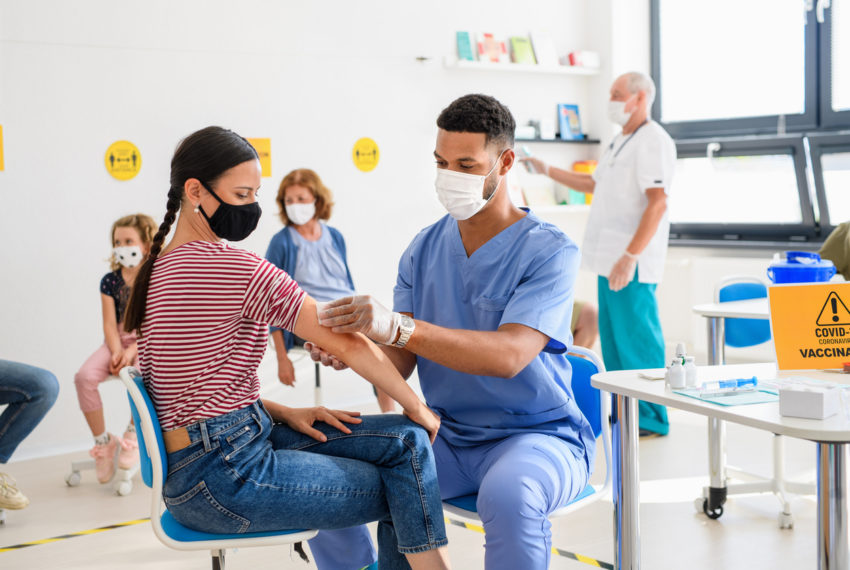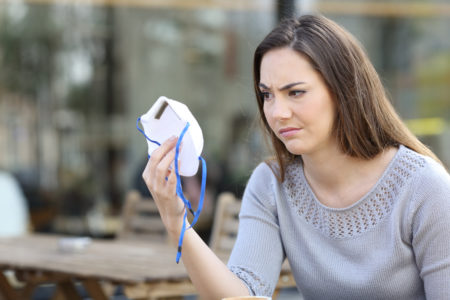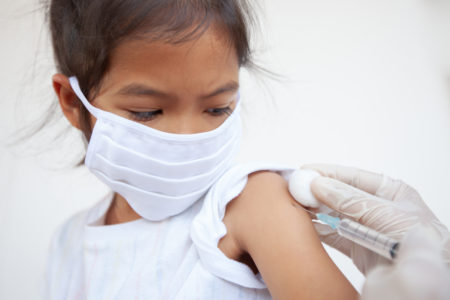
Share On Social!
As we fight the COVID-19 pandemic, we have to make sure we’ve got all the right facts.
Public health experts are seeing a lot of misinformation about COVID-19 spread on social media.
Whether conspiracy theories or jokes about side effects, experts are concerned about the implications it could have. Misinformation could especially hurt Latinos, who are being disproportionately hurt by the COVID-19 pandemic and have shown hesitancy about receiving the COVID-19 vaccine.
“It’s the repetition [of misinformation] that worries me,” said Eveyln Pérez-Verdía, a strategist who tracks Spanish disinformation, according to NBC News. “People are seeing this constantly.”
What is some of the misinformation being spread about COVID-19? Let’s check the myths and facts.
UPDATE 2/26/21: New research shows that people with lower education and health literacy levels are more likely to believe misinformation.
What are Myths and Facts about COVID-19?
There is an abundance of misinformation about the severity of COVID-19, safety measures, and about the vaccine.
Let’s start with the basics.
MYTH: COVID-19 is no worse than the flu.
FACT: While COVID-19 and the flu are both respiratory illnesses caused by viruses, COVID-19 is actually much more severe.
“COVID-19 appears to be more contagious and spread more quickly than the flu. Severe illness, such as lung injury, may be more frequent with COVID-19 than with influenza. The death rate also appears to be higher with COVID-19 than the flu. COVID-19 can cause different complications than the flu, such as blood clots and multisystem inflammatory syndrome in children,” according to the Mayo Clinic Health System.
While some of the symptoms of the flu and COVID-19 are similar, COVID-19 has greater potential to harm you and your family.
MYTH: Masks don’t protect you.

FACT: Wearing a mask is the simplest way to help stop the spread of the virus. COVID-19 can spread through tiny droplets when people talk and breathe. Masks block these droplets. Evidence has demonstrated that mask-wearing is associated with fewer cases and lower death rates.
MYTH: COVID-19 cases are only spiking because we’re testing more people.
FACT: The spike in infections is not related to an increase in testing.
“Of greater concern than the number of tests performed is the increase in the percentage of positive results. This means that the virus is quickly spreading in our communities,” according to the Mayo Clinic Health System.
MYTH: It would be better for us to reach herd immunity and let the virus spread through the population.
FACT: The safest way to protect the population is through vaccination, not through letting the virus spread uncontrollably.
“There are some significant problems with relying on community infection to create herd immunity to the virus that causes COVID-19. First, it isn’t yet clear if infection with the COVID-19 virus makes a person immune to future infection. If it does not create immunity, herd immunity will not work. If many people become sick with COVID-19 at once, the health care system could quickly become overwhelmed,” according to the Mayo Clinic Health System.
MYTH: Only elderly people or those with underlying health conditions will get seriously ill and require hospitalization for COVID-19.
FACT: COVID-19 impacts people of all ages. Anyone can get sick. Although some people with underlying health conditions are at a higher risk, even younger healthy people can be severely impacted.
What are Myths and Facts about the COVID-19 Vaccine?
There are also several myths circulating about the COVID-19 vaccine. Let’s address what we know.
MYTH: The vaccine will give me the COVID-19 virus.
FACT: Neither the Pfizer-BioNTech nor the Moderna vaccine will inject you with the COVID-19 virus.
“The first two COVID-19 vaccines that are available in the U.S. contain a strand of genetic material called mRNA. When the mRNA enters your cells, it instructs them to make a piece of the ‘spike’ protein that’s present on the coronavirus that causes COVID-19. Those protein pieces don’t actually harm your body, but they do trigger your immune system to mount a response to fight them off,” says Dr. Thaddeus Stappenbeck, Chairman of the Department of Inflammation and Immunity at Cleveland Clinic’s Lerner Research Institute, according to Cleveland Clinic.
MYTH: The vaccine will alter my DNA.
FACT: None of the COVID-19 vaccines will change your DNA. They are made from mRNA, but that will not change anything about your own DNA.
“Messenger RNA is something that’s made from DNA, but it’s not designed to integrate with our DNA, and it doesn’t permanently change our genome and who we are in any way,” Dr. Stappenbeck says according to Cleveland Clinic.
MYTH: The vaccine is made from secret, illegal ingredients, like fetal tissue.
FACT: Both Pfizer and Moderna vaccines consist of mRNA particles, lipids, acids, salts, and sugar. The ingredients are safe, standard, and publicly available. Companies have been transparent about the ingredients throughout the process.
“Overall, the main ingredients in the Pfizer-BioNTech and Moderna vaccines are very similar, both vaccines were found to be safe and efficacious in preventing symptomatic COVID-19 disease in rigorously conducted clinical trials,” says Dr. Juan Ravell, division chief of allergy and immunology at Hackensack University Medical Center, according to Hackensack Meridian Health.
MYTH: We can’t trust the vaccine because it was rushed.
FACT: The COVID-19 vaccine has not been “rushed.” It was produced faster because of more funding, urgency, and years of prior research.

In the past, vaccines have taken a longer time to reach the public because of a lack of funding and resources. With the COVID-19 vaccines, companies around the world have dedicated billions of dollars to help fund the efforts to fight the virus, because everyone recognizes how important it is to get immunity.
Even though COVID-19 vaccines have only been in development for the last year, it will be safe for the public because of the rigorous clinical trials that they have gone through.
Why does this matter for Latinos?
It’s important for everyone to be wary of misinformation, but Latinos may especially be at risk.
Misinformation is rampant in Spanish-language media and WhatsApp groups, according to experts.
Widespread misinformation may lead to fewer people taking the COVID-19 vaccine, which is the safest way to end the pandemic. This is important as Latinos are being hit the hardest by the virus.
Latinos are already skeptical about the vaccine.
“Another recent poll by the Kaiser Family Foundation asking more specific questions found that only 26 percent of Hispanics said they would get the vaccine as soon as possible, compared to 40 percent of whites. Around 43 percent of Latinos said they would ‘wait and see,’ and 18 percent said they would definitely not get the vaccine, according to the survey,” reports Carmen Sesin for NBC News.
The good news is that doctors can help make a difference and be a trustworthy source for Latino patients on COVID-19 facts.
“A Latino Decisions poll conducted in early October for the national advocacy organization UnidosUS found that 82 percent of Hispanics said they would trust their doctor or medical provider as a source on vaccine safety information,” according to NBC News.
How can we tackle misinformation?
When we encounter misinformation on social media, it’s important that we do something about it.
Here are some steps we can take when encountering misinformation about COVID-19.
- Correct it when you can.
“Re-sharing the original with a comment can sometimes help to amplify the original source. A better idea, used by some professional fact-checkers, is to take a screen shot of the image or video, and then draw a red X through it and share that,” according to the Washington Post.
- Don’t share content without examining it first.
“People are too quick to share information they can’t personally vouch for. Especially if you have a strong reaction, use that as a reminder to step away. Stop looking at it, then come back in a few minutes and ask yourself: ‘Do I really know enough to share this?’” according to the Washington Post.
- Help out friends and family who have fallen victim to fake news.
“Research shows that, in general, people tend to accept corrections from people they know more than people they don’t. If someone in your life shares misinformation on social media, don’t be afraid to fact-check them. If you want to correct them, be sure to do it in a friendly way,” according to Poynter.
When you correct misinformation, make sure you have the facts readily available.
One resource you can utilize is Salud America!’s “Juntos, We Can Stop COVID-19” campaign. This digital communication campaign aims to help Latino families take action to slow the spread of coronavirus.
The #JuntosStopCovid campaign features bilingual, culturally relevant fact sheets, infographics, and video role model stories to encourage Latinos to change their public health behaviors.
Share the campaign with your friends, family, and colleagues!
share the campaign in ENGLISH!
share the campaign in SPANISH!
Explore More:
Healthcare AccessBy The Numbers
142
Percent
Expected rise in Latino cancer cases in coming years



